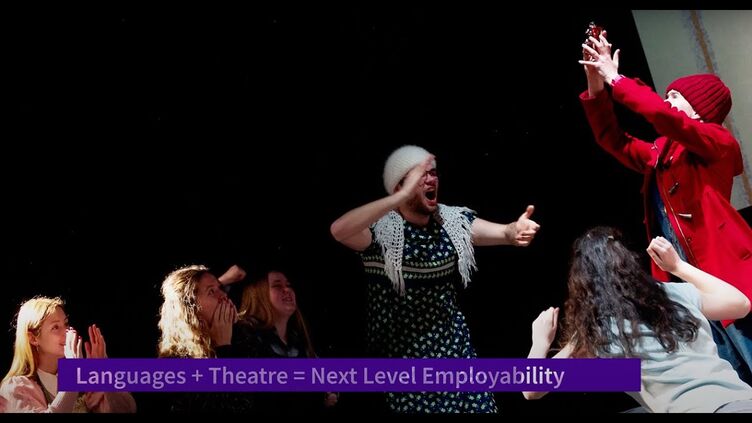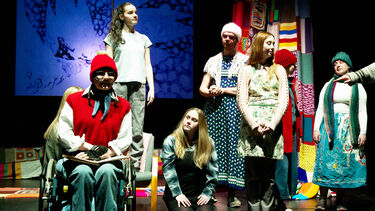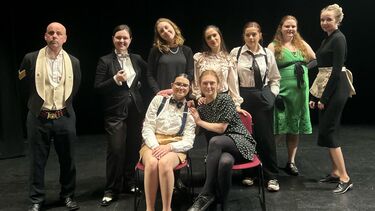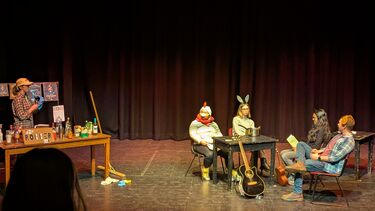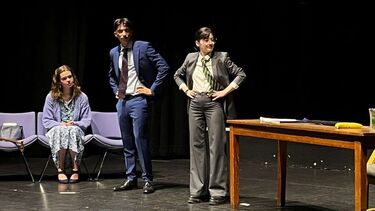Modern Languages Drama Festival Student Testimonies
Read more about the experiences of students who took part in the 2025 Modern Languages Drama Festival.
Dutch Play
M/Hond/Jongen by Bart Moeyaert
Lily Thacker (2nd Year, Dutch, German, & Philosophy) shares her thoughts of the Dutch play.
The Dutch Play came highly recommended. Older students who had taken part in the years before said it was as great way to improve Dutch speaking skills, especially for a beginner like me, as I only picked up Dutch in my second year. At first, I was really quite unsure. Surely my Dutch was nowhere near good enough to participate in a whole Dutch play? I could not have been more wrong!
There I went, together with my classmates Lizzie and Em, off to the first get together. And despite all the different levels of Dutch, we were welcomed completely and immediately! We soon felt right at home with everyone else and my worries of not being good enough disappeared entirely.
The following weeks were utter chaos in the best way possible. The Dutch play is a very collaborative project. We create it together and there is always space for everyone to try things out and to add ideas. And as the number of rehearsals increased, so did my confidence in speaking Dutch. We even spoke Dutch outside the theatre!
Looking back, I can only conclude it was a wonderful experience. It felt so amazing once the play was done, but I also felt really sad that it was over. I missed spending time with everyone in the rehearsals. We really had become a small family. The Dutch play was so unbelievably helpful in improving my Dutch and my speaking confidence. I could not recommend it enough to all students of Dutch, but especially to those new to the language, just like me!
French Play
Victor, ou les enfants au pouvoir by Roger Vitrac
Inga Kuliabina (2nd year, Economics & Modern Languages) looks back on her time in this year’s French play.
«Mais c’est un drame!» people who saw our French play say to me when they meet me. I'm laughing gleefully as they recognise me and remember my last line that ended the whole performance. But at the same time I think: ‘If it's a drama, it's only because it's over’....
In my case, this year was the first time I was able to participate in a French production, as last year I was stopped by the fact that I had just started learning French. I was already quite familiar with the theatre world and the world of concerts and performances thanks to ballroom dancing, but it was still exciting as theatre and ballroom dancing are different things for me. I decided for myself that my main goals in taking part in the performance would be to improve my French, to feel again that pleasant excitement before going on stage, to work with new interesting people like me who also love theatre and just to enjoy the process. And it all worked out!
It was five months of hard preparation, rehearsals and discussions. There were opportunities for everyone who wanted to be involved: actors, backstage managers, lighting people. In the end we had a great team, all interested in the process, and we had wonderful directors Dr Sophie Maddison and Dr David McCallam who were also part of the cast and performed with us on stage. During our time together, we all became real friends. The play definitely helped me improve my French, as there were a lot of words that you don't often hear and learn when learning the language.
The finale was our trip to Bristol, where we went after two performances in Sheffield. There we had to play in a lecture theatre, which was quite unusual due to the lack of backstage and a much smaller stage, but we did well anyway.
Overall I would like to say that I am very glad that I made the decision to take part in Victor ou les enfants au pouvoir this year, as it has not only developed certain necessary skills but has also helped me to build up more self-confidence. Thank you to everyone who took part in one way or another and see you in the next productions!
German play
Die Sheffielder Stadtmusikanten oder der Vorfall auf West Street
Bianca Sevidal (2nd year, Digital Media & Society) reflects on her time in this year’s German play.
I’m a second year student studying BA Digital Media and Society but I chose to have German as my optional modules since I first entered university. It’s fun learning German, however, because it’s an optional module I often had trouble finding time to practice outside of my seminars and tutorials despite my love for the language.
I honestly just happened to join the play’s organising team on a whim. I received an email about it and initially didn’t want to join because I found the premise to be quite intimidating; I didn’t want to act because I was unconfident in my German speaking skills. During the first meeting I attended, I was relieved to hear that I could just be part of the tech team. It took us about a week and a bit to figure out what the premise for a play would be before we stuck with the Die Bremer Stadtmusikanten (the Bremen Town Musicians) as the stars of our show, but the idea of fairytale characters appearing on West Street was something we had in mind from the beginning.
I admittedly didn’t quite know how else to support the team while waiting for my time to learn how to operate the lights or sound, so I mainly helped in creating the play’s promotional materials. A few of the German tutors decided to take on acting roles. I did not realise at the time, though, that we were still missing one character when I turned up to rehearsal. Upon arriving, I was asked if I could play the role of the Rooster, a member of the Bremen Town Musicians. Because this would be an important role that didn’t have many lines, I decided to take on the responsibility instead of being a stage technician (in my stead, one of our producers fulfilled this duty). It was quite nerve-wracking because I joined the acting side only two days before the play’s premiere. Those following two days were occupied by script revisions, rehearsals, and lots of line memorisation as we did our best to prepare to perform a comedic 45-minute play.
Although there were still times I fumbled my lines, the other cast members supported me. This experience was one that I never thought I’d ever have to do, but it was really fun just getting to interact with other people who love German as well, and was a great way for me to gain more confidence in my speaking skills. For anyone curious yet hesitant about joining a play, my best piece of advice would be to just do it! Being part of a play is one of the best ways to push yourself out of your comfort zone, and it's an amazing feeling fulfilling it alongside your tutors, course mates, and friends. Everyone who came to watch us was so supportive, so don’t worry about feeling anxious over making mistakes!
Overall, although there were some stressful moments, being part of this experience is one of the highlights of my second year of university so far. Being part of the play was an immensely rewarding experience, and seeing the culmination of our hard work all come together is something I will never forget.
Spanish play
Una mariposa blanca by Gabriela Roepke & Final absurdo by Laura Freixas
Harri Kasperowicz (1st year, Linguistics & Modern Languages) shares his thoughts on this year’s double bill of Spanish-language productions.
The task of being involved in a play, much less directing, was a daunting one, and one which I had not intended to take up at all. Growing up in a rural working-class family, my experience of theatre was largely confined to mobile theatre - pantomime and anti-bullying parables. What we performed was quite different! Moreover, as a first-year student, I hadn’t yet experienced anything to do with the Drama Festival, which meant I was going into it totally blind. Although at the time this was nerve-wracking, looking back I feel I learned quite a lot about how theatre works, and it brought an unconventional approach to the production which suited the strange stories we were setting out to tell. And perhaps most importantly of all, I was never alone at any stage of the process.
For instance, the original plan was to stage a different play which had been suggested by Spanish professor Phil Swanson, but it became apparent that it would be impossible to produce in the time we had, and thus a short, relatively small-scale play was needed. In the end, the play I found was so obscure I had to order a digital scan from America of a book from about 30 years ago. After a few read-throughs of the play, we realised that the play was only about half the runtime that we had booked. I decided that we would put on a second, equally short and sweet play, and remembered a short story I had read some years ago which could be adapted to fit these needs. Josephine Sennett very kindly wrote out an initial translation of the play from page to stage and I edited it to suit our needs. Whilst we were working on the two plays, the two of us noticed patterns between the two stories – a character called Luisa; a missing umbrella; unnamed, knowing women who upturn precise systems of order, to name some examples – and decided to really lean into this. A puzzle of a play, which could be both two stories and yet the same story in one go, something which would make the audience go home and try and solve it for a long time afterward. Given some of the bemused conversations I had with the audience afterwards, I’d say we succeeded.
If it isn’t obvious, this play was a collective effort at breakneck speed. Unlike the other productions, the Hispanic Society performs the play with no direct involvement from the department. This means we rely hugely on each other’s experience, insight, and above all passion. I’d like to thank our actors, Phil, Josie, and Liz, but also Enric, Renata and Hannah, all of whom were totally on board with all the strange changes, suggestions and ideas I threw at them. I’d also like to give a special thank you to Chloe Johnson, who stepped in at the last minute to do lights and sound from the cue box. The final product was exciting, fresh and above all strange – in other words, exactly everything I’ve ever wanted to get from a story. I’m hugely proud of what we put together, and I hope that they are too!

Experience ¾«¶«Ó°̉µfor yourself
The best way to find out what studying at ¾«¶«Ó°̉µis like is to visit us. You'll get a feel for the atmosphere, the people, the campus and the city.

